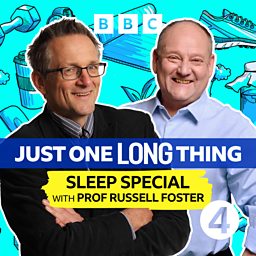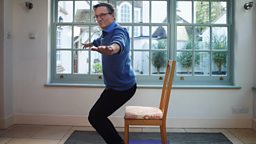Six secrets to a good night’s sleep
Do you find it hard to drift off at night? Often feel groggy in the morning after a poor sleep? Panic not!
For a special edition of his Just One Thing podcast, Michael Mosley quizzes Prof Russell Foster – Director of the Sleep and Circadian Neuroscience Institute at the University of Oxford – about the best ways to get some quality shut-eye.
How many hours do we really need to ensure a refreshing slumber? What are the dos and don’ts of sleep hygiene? And if he had to choose, what is Russell Foster's top tip for ensuring a good night’s sleep?
> Listen to Michael Mosley's interview with Russell Foster


1. Don’t stress about getting eight hours
“Don’t obsess about the mythical eight hours of sleep,” says Prof Russell Foster, “it’s an average.”
The default state is not a single block of sleep but bimodal or polyphasic.Prof Russell Foster
The National Sleep Foundation tells us that the healthy range is between six and ten and a half hours, “so it’s about finding what your sleep needs are.”
“The question you should ask yourself is, do you feel that you can perform at your peak during the day?” says Russell. “Also, if you oversleep extensively on free days and particularly when you go on holiday, that can really unmask your endogenous sleep pattern.”
Listen to the Sleep Special for more clues as to whether you are getting enough sleep.
2. If you wake in the night, don’t panic
A study of sleep in the pre-industrial era found that there was a bimodal pattern of sleep: given the opportunity humans will go to sleep, wake up after a few hours and interact, then have another episode of sleep before waking up in the morning.
“The default state is not a single block of sleep but bimodal or polyphasic,” says Russell, “and the problem is that most people don’t know that.”
If you wake in the night don’t get up and start doing your emails. Stay relaxed, keep the lights low, find something soothing to listen to, and you should soon drift off again.
3. Make big decisions after you’ve slept on them
If you have a life-changing decision to make, don’t do it when you’re tired – sleep on it.
In the day, we’re bombarded with information. But when we’re asleep our brain has the time and capacity to begin to process it. “You’re not only retaining facts, and the stuff that’s come in during the day, but you’re manipulating and playing with that information,” says Russell.
Research has shown that we’re better at performing tasks after a full night of sleep. “If you want to come up with innovative solutions to complex problems then a night of sleep can enormously enhance your capacity to do that. Sleeping on it really does have a basis in science!”
4. Train your sleep pattern to suit your lifestyle
“Know your chronotype,” advises Russell. This is the technical term for the time of day your body naturally wants to sleep and wake up - either early, late or somewhere in between.

A great night’s sleep starts from when you wake up.Prof Russell Foster
About 10% of the population are “larks”, wanting to go to sleep around 7 to 8pm. 65% of us are “doves”, going to bed around eleven or a little earlier. And 25% of us are “night owls”, retiring after midnight.
Your chronotype is dictated by three factors: genetics, age, and when we see light. The third factor is the one we can manipulate.
Morning light will advance your body clock and make you get up earlier and go to bed earlier; dusk light will delay the clock, make you go to bed later and get up later. Want to become more of a morning person? Get outside at seven and experience bright natural light. If you’re waking too early, wear dark glasses, keep your blinds shut, and make sure you’re exposed to natural light in the evening.
5. Don’t have difficult conversations when you're tired
Don’t discuss anything stressful when you’re lying in bed – even if it’s the only time you get to talk to your partner. It can increase anxiety and make it hard to sleep.
The tired brain is a “very strange organ”, says Russell. Studies have shown that it will remember negative experiences but forget positive ones. You’re also much more likely to have a loss of empathy and won’t pick up social signals in the person you’re talking to. You’ll be more impulsive, saying stupid and unreflective things, and you’ll have greater levels of irritability. “So, this is not a good time to have a conversation!”
6. A good night’s sleep starts with how you spend your day
If Russell had to choose “just one thing”, it would be this: “A great night’s sleep starts from when you wake up.”
“We’re used to thinking that the quality of our sleep defines the quality of our consciousness and awake state, but it’s reciprocal,” he says. “The quality of our awake state will very much influence the quality of the sleep that we get.”
Here are some things you can do in the day to help you sleep at night:
• Get outside for a dose of natural light in the morning.
• Make sure any daytime nap is no longer than 20 minutes and not too close to bedtime.
• Avoid excessive consumption of caffeine and be careful how late you drink it.
• At bedtime, try to wind down and step back from any anxieties. Mindfulness exercises or yoga can help.
• Stop using devices at least 30 minutes before going to sleep.
• Avoid alcohol.
• Make sure your bedroom is cool, around 18C.
• Keep your room as dark and quiet as possible.
• Get any work-related items out of the bedroom.
For more on all these tips, listen to Michael Mosley’s Sleep Special – with Prof Russell Foster
More from Â鶹ԼÅÄ Radio 4
-
![]()
Sleep Well with Michael Mosley
Get comfortable, relax and drift off with Dr Michael Mosley's series, Sleep Well.
-
![]()
The Sleeping Forecast
A unique journey to dreamland, mixing instrumental music and Radio 4's Shipping Forecast.
-
![]()
Understanding your body clock
Circadian rhythms are are found throughout the living world. How much do you know about yours?
-
![]()
10 ways to improve the quality of your sleep
Tips and tricks to help you get a good night’s sleep.




















































